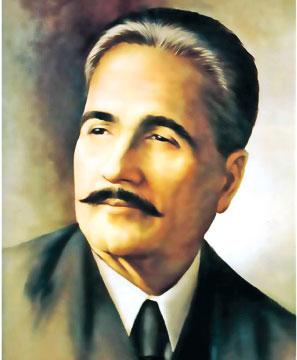
Once, a school student, who turned up late for class was asked by his teacher, “why are you so late?” “Iqbal always comes late” replied the student. The teacher was surprised by the intelligent and confident answer. This student was none other than the poet of the East , Dr. Sir Muhammad Iqbal.
Born on Friday, November 9, 1877 in Sialkot Pakistan, Iqbal’s ancestors hailed from Kashmir. The grandfather of Iqbal Shaikh Muhammad Rafiq, had migrated from his ancestral village of Looehar in Kashmir and come to settle in Sialkot along with his three brothers at the beginning of the 13th century. The family of Iqbal never returned to Kashmir but the memory of Kashmir and the inhabitants of Kashmir were never erased from the great man’s mind. Iqbal shows his love for Kashmir in several of his poetic verses. In one verse, he says: My body comes from the earthy paradise of Kashmir; my heart belongs to the holy land of Hijaz, and my song to Shiraz.
Iqbal was a great poet, thinker, philosopher, statesman, teacher, and lawyer of a distinguished quality. His intellectual ability and performance was not just meant for finding solutions for any particular group but for the whole of humanity, especially, for Muslims. Iqbal was well aware of the circumstances of both the East and the West as he was born and brought up in the former and got his higher education in the latter. Iqbal was a scholar par excellence who spoke his heart and mind through his poetry, lectures and philosophical writings. Dr RA Nicholson , the scholar who translated Asrar-i-Khudi into English spoke about Iqbal, his excellence, boldness and high thinking. In his words: “Iqbal is a man of his age and a man in advance of his age”. Without a strong conviction, a poet can never conquer his milieu. (In this sense, Iqbal was a great conqueror). He had a purpose before him. He had a beautiful view of life. To live was to conquer. He made others see and feel what he saw and felt.
Iqbal was very much concerned about the youth. He encouraged them to reach the heights of glory and success. He says, when you reach those commanding heights Almighty Allah makes you a friend and would ask you, what do you want me to do for you? He referred to the youth with the name of Shaheen, i.e. those who can pull down the stars to themselves
Iqbal says: “Mohabbat Muje UnnNojawanon Se Hai, Sitaron Pa DalteHain Jo Kamand” ( I have love for those youngsters who pull the stars down).
Iqbal was a poet of hope and courage. He says, one should use his heart to understand the supernatural forces hidden in the self. The great genius was against all kinds of slavery, blind imitation, aimlessness both in thought and in action.
Iqbal used poetry as a vehicle to deliver his message and to awaken the consciousness of the Muslims. He stressed on education and knowledge and applying them in everyday life. He was of the view that we are not living in the universe which is closed or complete rather we live in the universe which is in a constant process of development.
Iqbal finds Islam to cater to the material as well as spiritual needs of human beings and bring spiritual brotherhood of all mankind.
In 1920, after the publication of “ The Secrets of the Self, the name and fame of Dr Iqbal was carried over to Europe and his philosophic genius and poetic talent recognized by the British government.
The honour of Knighthood was conferred on Iqbal by the British government in 1922. When Iqbal was nominated for the knighthood he refused to accept it unless and until his teacher, Moulavi Mir Hasan was honored with the title of Shams ul Ulama (the sun of scholars). The governor of Punjab inquired from Iqbal whether there was any creative work of his teacher, indicating towards himself, Iqbal replied: ‘I am one of his great works alive’. Ultimately, the teacher and his pupil were honored with the title of Shams ul Ulama and Sir, respectively.
Iqbal appreciated western philosophers because of their research oriented thinking and intelligence. He admired the good qualities he had seen in them, but without fail, he highlighted the faults and loopholes in their philosophy and education. According to Iqbal: “The European man of wisdom does not possess a wakeful heart, but he possesses a wakeful eye”.
The father of Dr Sir Muhammad Iqbal Sheikh Noor Muhammad had seen a dream before his birth which he used to tell his friends in the latter part of his life: “I saw a dream where a big crowd gathered in a large field.
A lovely coloured bird was flying over our heads, and every one tried to catch it, but one succeeded. At last, it came down and flew right into my hands”. His dream turned into reality by the emergence of Iqbal as a poet and philosopher, who gained international repute by virtue of his dedicated service to humanity and Islam.
The author is a PhD Research Scholar. He can be reached at:
Source:
https://kashmirreader.com/2018/11/08/remembering-the-poet-of-the-east-th...
